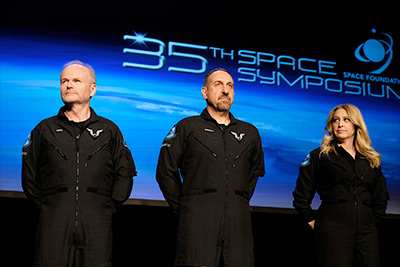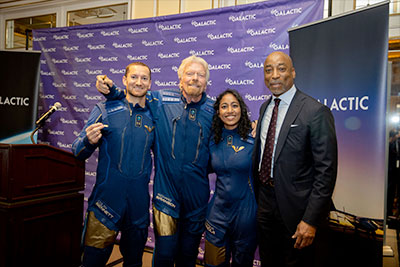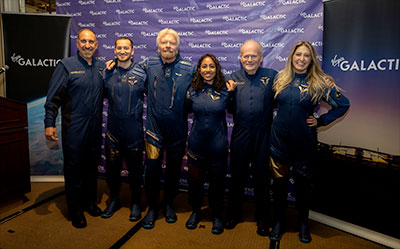 Space News space history and artifacts articles Messages space history discussion forums Sightings worldwide astronaut appearances Resources selected space history documents |
If you have previously registered, but forgotten your password, click here.
| ||||||||
| Robert Pearlman | collectSPACE Virgin Galactic SpaceShipTwo pilots awarded FAA astronaut wings 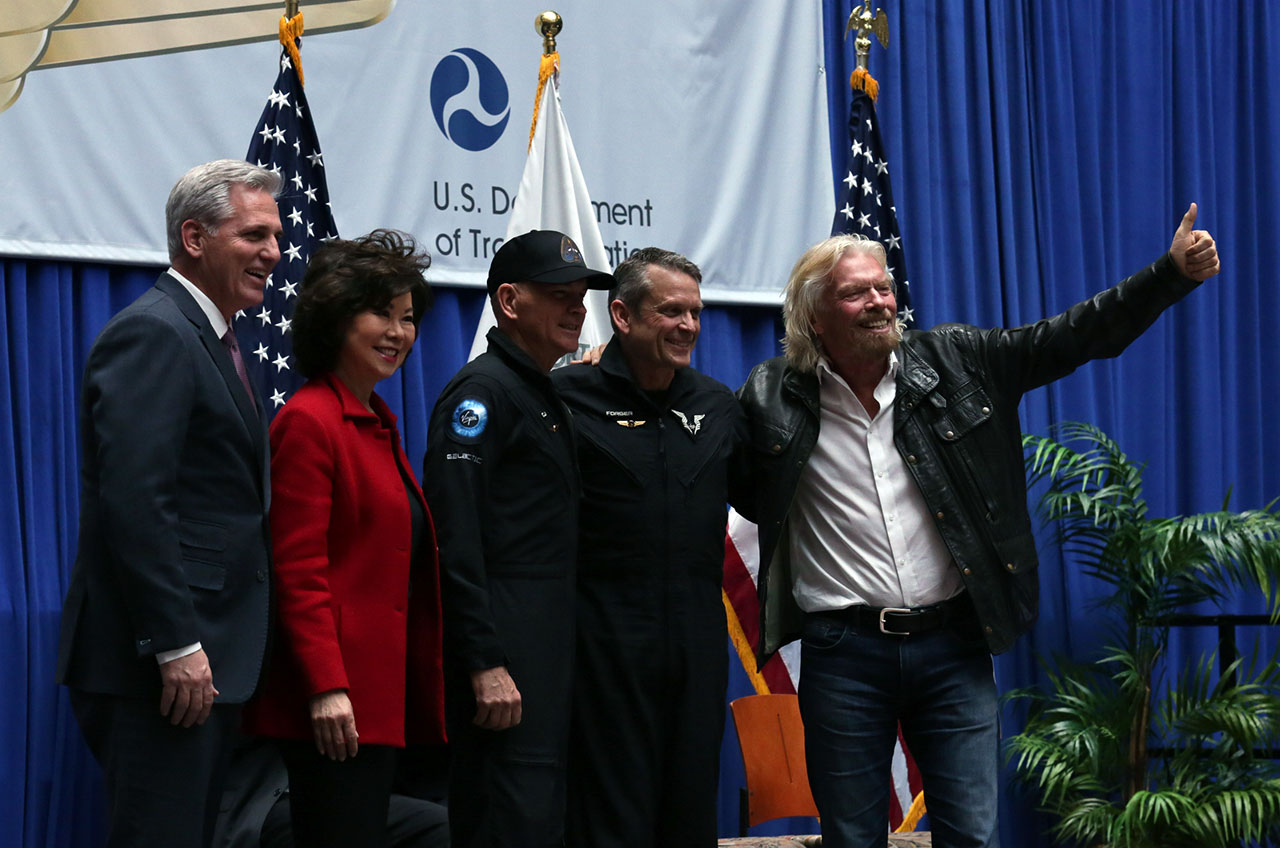 | |||||||
| Hart Sastrowardoyo | I guess I should have asked either the FAA or DOT representatives there: Why the change in design of the astronaut wings? | |||||||
| Robert Pearlman | Virgin Galactic release Three Virgin Galactic Crew Presented with Commercial Astronaut Wings at 35th National Space Symposium | |||||||
| 328KF | I imagine mine wasn't the only eyebrow raised when I saw Beth Moses being awarded the astronaut wings today. It seemed a bit inappropriate that the FAA would be in a position to present/award/rate a non-licensed person with anything. So, after some research and a conversation with Robert, I've come up with this: First, this is not an issue about altitude, or about tourists. That's been covered elsewhere, including in a great article by Eric Berger, in which Robert himself is quoted. My issue was with what it is the FAA is actually issuing to the crews. Turns out, it's not very obvious. Previously, as was the case with SpaceShipOne, the assumption was that "crew" were, by definition, FAA-licensed pilots. The FAA definition of "crew" or "flight crew" is "a pilot, flight engineer, or flight navigator assigned to duty in an aircraft during flight time." That clearly means that to be considered "crew," one had to be licensed by the FAA as any of the above, with the appropriate medical certificate. Aircraft manufacturers and operators routinely fly with engineers and FAA-licensed mechanics aboard test flights during certification or maintenance. Some of these flights can get "sporty," to say the least. When they return, they are not eligible for any FAA recognition or rating, so one might wonder what the difference here is, if any. Under the latest FAA regulations related to commercial spaceflight, they have chosen to define "crew" as: Any employee or independent contractor to a licensee, transferee, or permittee... who performs activities in the course of that employment or contract directly relating to the launch, reentry, or other operation of or in a launch vehicle or reentry vehicle that carries human beings. A crew consists of a flight crew and any remote operator.Among many other requirements, a pilot or remote operator must "possess and carry an FAA pilot certificate with an instrument rating." Also, "Each crew member with a safety-critical role must possess and carry an FAA second-class airman medical certificate issued... no more than 12 months prior to the month of launch and reentry." So, unlike any other aspect of commercial aviation, the FAA has decided to define "crew" as practically anybody employed by the operator, who is performing some undefined task. The medical requirement is also nebulous because the rule does not define what a "safety-critical role" is. So what exactly are "astronaut wings"? At the present time, the FAA does not have a "commercial astronaut" certificate or rating. I believe there was some misunderstanding about this based upon early reporting done around the time of the SS1 flights. So, in what is termed an "interim measure," the agency has issued these wings. The FAA says the initiative "is designed to recognize flight crewmembers who further the FAA's mission to promote the safety of vehicles designed to carry humans. Astronaut Wings are given to flight crew who have demonstrated a safe flight to and return from space on an FAA/AST licensed mission," and, "to be eligible for Astronaut Wings, nominees must meet the following criteria and submit an application to the FAA:
Yet another undefined term is what exactly a "safe flight to and return from space" consists of. That would imply that "crew" that either wrecks or has to bail out after achieving 50 miles would not be eligible? So it seems that, at present, these wings are little more than a recognition/public relations device than they are the issuance any rating, certificate, or title to any participant in a spaceflight. The "astronaut" title, as I mentioned before, is a sticky subject, with a wide variety of opinions from professional astronauts, private spaceflight participants, and even the payload specialists who orbited Earth aboard the shuttle. As I found writing "Come Fly With Us," many of the PSs shy away from referring to themselves by the title. In my opinion, aside from the title itself, I think the FAA has done a disservice by applying a different standard (in how they define "crew") here than anywhere else in aviation. | |||||||
| Robert Pearlman | FAA Commercial Astronaut Wings are in the same category as NASA gold astronaut pins and the U.S. military's astronaut wings — they are all awards or honors. And yes, they are all public relations tools, too; a way to remind the public that the issuing entity has a role in putting people into space. | |||||||
| Hart Sastrowardoyo | quote: I realize this is splitting hairs, but my definition of an astronaut is someone taking a primary role in either the craft or mission. Therefore, one piloting a craft in whatever your definition of space is would make one an astronaut. I have little issue with PSs like Charlie Walker or the Spacelab PSs calling themselves astronauts. They have taken an active, primary role in the mission - Walker with the McD experiment(s) and the Spacelab PSs, that's the very reason for their mission. Again, splitting hairs, but I don't believe Moses in the five minutes or so of weightlessness, would qualify to be called an astronaut, despite her evaluating the cabin during that time. Nor do I believe the PSs, who flew as a favor / thank you / babysat a satellite deployment would qualify to be called astronauts either, despite them taking part in secondary objectives. | |||||||
| Robert Pearlman | Via Twitter, a close look at Beth Moses' Commercial Astronaut Wings. The photos reveal each pin is serialized and are made by Johnson's of Dayton, Ohio. 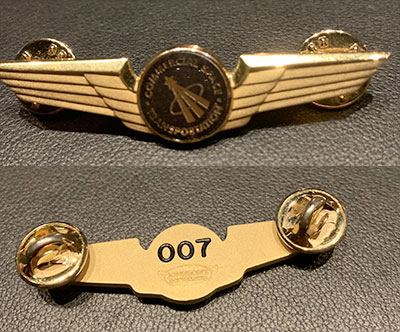 | |||||||
| JohnPaul56 | Shouldn't the term, "astronaut" be reserved for career pilots or scientists who train to fly in space as a career choice? If I'm just paying to be a passenger on a space vehicle, I would think that that I'm just a passenger, and the term "astronaut wouldn't really apply to me, no more that me calling myself an "aeronaut" because I've flown on countless passenger planes. I'm not really sure of the status of the first few paying passengers on Virgin Galactic because I have heard that they do require some training. But I doubt its anywhere near the amount of training that NASA astronauts require. Editor's note: Threads merged. | |||||||
| Robert Pearlman | "Astronaut," with a capital "A," applies to the profession, as is the case of members of NASA's corps and the pilots and flight crew who work for the private spaceflight companies. Apropos to this thread, the FAA awards Civilian Astronaut Wings to any member of the flight crew who enters space aboard a private vehicle. At its most basic, though, the title of "astronaut" (lower case "a") indicates that someone has crossed from Earth's atmosphere into space. Companies like Virgin Galactic offering suborbital flights use the term accordingly for their crew and passengers. At some point, as more and more people experience spaceflight, the application of the term in this regard may fall out of vogue, just as the term "aviator" — which used to apply to anyone who flew on an aircraft — gave way to flight crew titles and passengers on commercial airlines. | |||||||
| Robert Pearlman | The FAA has revised its policy (as of July 20, 2021) as to who is eligible for its Commercial Space Astronaut Wings Program. As before, you can earn the wings if you are a commercial launch crewmember, which means you:
There could be individuals whose contribution to commercial human space flight merits special recognition. The Associate Administrator for Commercial Space Transportation (AST-1) has total discretion regarding identifying and bestowing FAA honorary award of Commercial Space Astronaut Wings to individuals who demonstrated extraordinary contribution or beneficial service to the commercial human space flight industry. | |||||||
| Robert Pearlman | Federal Aviation Administration (FAA) release FAA Ends Commercial Space Astronaut Wings Program, Will Recognize Individuals Reaching Space on Website | |||||||
| David C | Much more appropriate for those not at the controls. What about for pilots though? | |||||||
| Robert Pearlman | After Jan. 1, there will be no more wings awarded to anyone, regardless of position. | |||||||
| perineau | The death of astronaut wings — rather sad, really. | |||||||
| Robert Pearlman | It is only the end of FAA Commercial Astronaut Wings. The U,S. military branches still award their wings and the respective spaceflight companies have their own. (NASA has never awarded wings, only the astronaut pin.) | |||||||
| oly | Both SpaceX and Blue Origin have their wings that they present to the crew. As the FAA have little to do with each mission besides provide regulatory permissions and US airspace restrictions, the company wings probably hold more significance to the participants. | |||||||
| Robert Pearlman | Wayne Monteith, Associate Administrator for Commercial Space Transportation for the Federal Aviation Administration (FAA) presented the Blue Origin NS-16, NS-18 and NS-19 crews with their Commercial Astronaut Wings during a ceremony held on Feb. 16, 2022 as part of the Commercial Space Transportation Conference in Washington, D.C. From Blue Origin (via Twitter): The crews of NS-16, NS-18 and NS-19 received their FAA Astronaut Wings. Congratulations Astronauts! 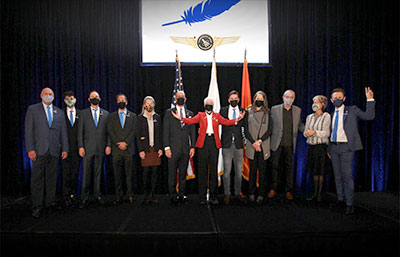 Wally Funk received the wings numbered 13 in recognition of her history with the "Mercury 13." A separate ceremony is expected later this year to award Virgin Galactic's Unity 22 crew with the last of the physical wings still pending presentation. | |||||||
| ejectr | Where is Michael Strahan? | |||||||
| Robert Pearlman | Strahan, William Shatner and Jeff Bezos were unable to attend the ceremony and will receive their wings at a later time. | |||||||
| Robert Pearlman | Virgin release Astronaut wings | |||||||

